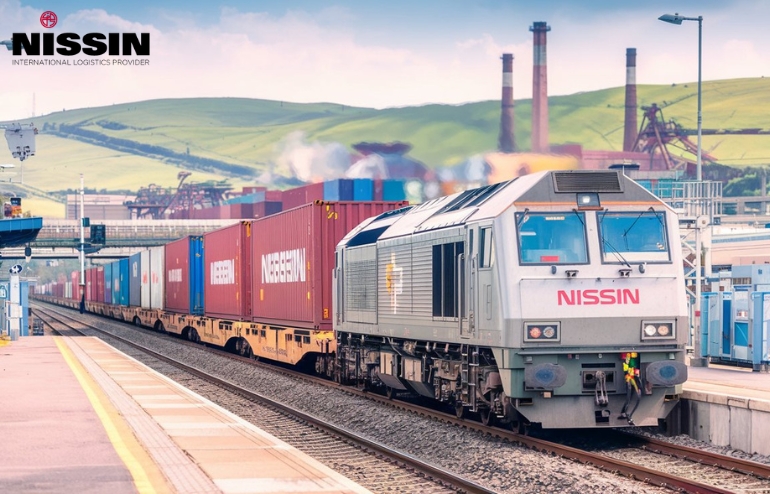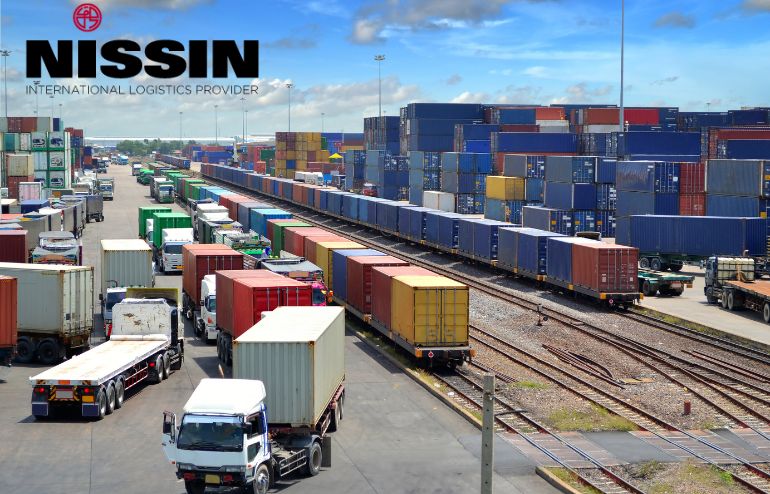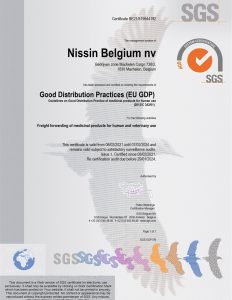Strong logistics systems are essential because of the constant risk of supply chain disruptions. Train freight offers a reliable solution for transporting large-scale goods, saving costs and reducing environmental impact. By integrating rail logistics into transport strategies, businesses can reduce risks and maintain operational continuity, especially when moving high volumes of goods.
Role of Train Freight in Modern Supply Chains
Train freight is economical and environmentally friendly for transporting substantial loads over long distances. Its ability to alleviate road congestion and minimize emissions makes it a favorable option for industries such as manufacturing.
Why Rail Freight is Vital for High-Volume Shipments
Rail freight transportation is well-suited for high-volume shipments because it can cost-effectively transport large quantities of goods. It facilitates bulk loads in fewer trips, reducing transportation expenses and shortening transit times.
Moreover, rail transport’s sustainability produces fewer emissions than road transport and benefits industries such as agriculture, manufacturing, and energy that depend on reliable delivery for heavy and long-distance shipments.
Benefits of Rail Freight for Supply Chain Resilience
It offers a range of benefits that contribute to supply chain resilience, particularly for industries that require moving large or heavy goods. Below are some of the most notable advantages:
1. Cost-Effective Transportation for High-Volume Goods
Rail freight transportation allows businesses to move bulk goods at a lower cost than road transport. Moving more goods in fewer trips reduces the per-unit transportation expense. Additionally, trains consume less fuel than trucks, which translates into lower costs, especially for long-distance transportation.
2. Improved Reliability and Fewer Delays
It is less affected by common road transport issues like traffic, accidents, or weather. Trains operate on fixed schedules and dedicated tracks, providing a more predictable option for long-distance deliveries. This predictability further allows businesses to plan their logistics more effectively and avoid delays.
3. Increased Capacity for Heavy Goods
Rail freight carries much larger loads than trucks, making it ideal for industries that regularly transport raw materials, machinery, or other bulky items.
Overcoming Challenges in Supply Chain Visibility
Modern rail freight tracking systems improve supply chain visibility by connecting with different tracking platforms to create a consistent approach. These systems quickly gather and analyze large amounts of data, which is essential for effective supply chain management.
Next-generation tracking technologies use cloud computing, Internet of Things (IoT) sensors, and data analytics to turn past challenges into practical solutions. By moving away from manual processes and outdated systems, these technologies enhance the tracking of goods over long distances, reducing risks and improving overall performance.
Why Rail Freight is the Future of Supply Chain Efficiency
Rail freight is vital for modern supply chains as businesses face rising competition and global challenges. Its ability to transport goods reliably, reduce environmental impact, and manage larger volumes positions rail freight as a key solution for strengthening logistics strategies and promoting sustainability. Below are some key reasons:
1. Scalability for Growing Businesses
As companies grow, so do their transportation needs. Train freight offers the flexibility to handle increased volumes of goods while maintaining smooth operations. This makes it a strong option for businesses that are scaling or facing seasonal fluctuations in demand.
2. Integration with Other Modes of Transport
Rail freight works well with other forms of transport, such as trucking or shipping, providing a seamless transition for businesses moving goods across multiple regions. This integrated approach helps avoid delays and keeps operations running smoothly.
Nissin Belgium Services in Rail Freight Logistics
Nissin’s rail freight services help businesses maintain strong supply chains for high-volume shipments. With extensive knowledge of rail logistics, Nissin offers reliable transport solutions that align perfectly with your existing logistics network.
Key Benefits of Nissin’s Rail Freight Services:
1. Customized solutions to industries like manufacturing, energy, and retail. This flexibility allows Nissin to address each sector’s needs and challenges, optimizing transport for unique goods and requirements.
2. Rail transport is cost-effective for bulk goods, reducing costs compared to road or air freight. By utilizing rail transport’s efficiency, Nissin can pass on savings to clients, making it a financially viable option for large shipments.
3. Environmentally friendly shipping that lowers the carbon footprint of large shipments. Utilizing rail transportation significantly reduces greenhouse gas emissions, making it a responsible choice for companies prioritizing sustainability.
4. Complete logistics management for secure and timely deliveries. Nissin takes care of every detail in the transport process, from planning to delivery, so you can relax knowing your shipments are in good hands throughout the journey.
5. We provide real-time updates so you always know where your shipments are. These updates offer peace of mind and respond quickly to potential issues during transit.
Final Thoughts on Train Freight for High-Volume Goods Transport
Today, train freight is a reliable and affordable option for businesses transporting large volumes of goods while maintaining a strong supply chain. Adding rail logistics into your transport strategy can reduce costs, improve reliability, and create a more sustainable and resilient logistics network.
For businesses managing large shipments, Nissin’s rail freight services provide the support needed to keep goods moving efficiently. Contact us for rail freight solutions and learn how Nissin Belgium can improve your supply chain. Call +32 2 751 44 99 or email HowCanIHelpYou@be.nissin-eu.com with your specific requirements.
We look forward to assisting you!







